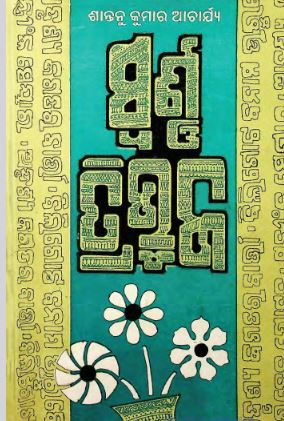Swarna Tribhuja, a notable Odia novel written by Santanu Kumar Acharya and published in 1998, stands out as a significant contribution to contemporary Odia literature. This book not only showcases Acharya’s exceptional storytelling abilities but also serves as a profound exploration of social themes that resonate deeply with the Odia populace.
Set against the backdrop of a rapidly changing society, “Swarna Tribhuja” encapsulates the intricate dynamics of personal relationships, social strata, and the moral dilemmas faced by individuals in their quest for identity and belonging. The title itself, which translates to “Golden Triangle,” symbolizes the interconnectedness of three crucial elements in life – love, power, and social responsibility – all of which play pivotal roles in the narrative.
At the heart of the novel is a multi-dimensional protagonist who navigates through various challenges emblematic of modern Odisha. Acharya deftly portrays the protagonist’s internal conflicts and interactions with a diverse cast of characters, each representing different facets of society. The novel not only highlights the personal struggles of the individuals involved but also acts as a mirror reflecting the larger socio-political context of Odisha during the late 20th century.
One of the most compelling aspects of “Swarna Tribhuja” is its exploration of social issues, particularly those related to caste, class, and gender. Acharya addresses these themes with a sensitivity that encourages readers to reflect on their own societal positions and prejudices. He bravely delves into the nuances of caste dynamics, revealing how deeply entrenched beliefs and practices continue to shape relationships and opportunities, often leading to discrimination and inequality.
Moreover, the novel is enriched by its vivid characterizations and culturally significant settings that evoke a sense of nostalgia for Odia traditions while also critiquing the vestiges of outdated customs. Through his characters, Acharya advocates for progress, urging society to embrace change and evolve beyond the confines of traditional norms. The struggles of women in the narrative particularly stand out, as they are portrayed not merely as victims but as resilient individuals striving to forge their own paths amid societal constraints.
Acharya’s narrative style combines lyrical prose with a clear-eyed realism that draws readers into the emotional landscape of the characters. His ability to weave intricate plots while maintaining a focus on social commentary sets “Swarna Tribhuja” apart from other works in Odia literature. Each chapter is carefully constructed, leading readers through a tapestry of events that culminate in a thought-provoking conclusion, urging introspection and highlighting the importance of empathy in human relationships.
In conclusion, “Swarna Tribhuja” is not just a novel; it is a compelling exploration of the very essence of humanity as it grapples with societal expectations and individual desires. Santanu Kumar Acharya’s work remains relevant today, inviting readers to engage with the complexities of their own lives and the world around them. As Odia literature continues to evolve, “Swarna Tribhuja” holds a cherished place, embodying the transformative power of storytelling and its ability to foster understanding and change within society.
Books Info
| Books name | Swarna Tribhuja/ସ୍ବର୍ଣ୍ଣ ତ୍ରିଭୁଜ |
| Editor | Santanu Kumar Acharya |
| No Of pages | 261 |
| Publisher | Grantha Mandira |
| Publication | 1998 |
| Printed At | Optima Printers |
| Distributor | NA |

